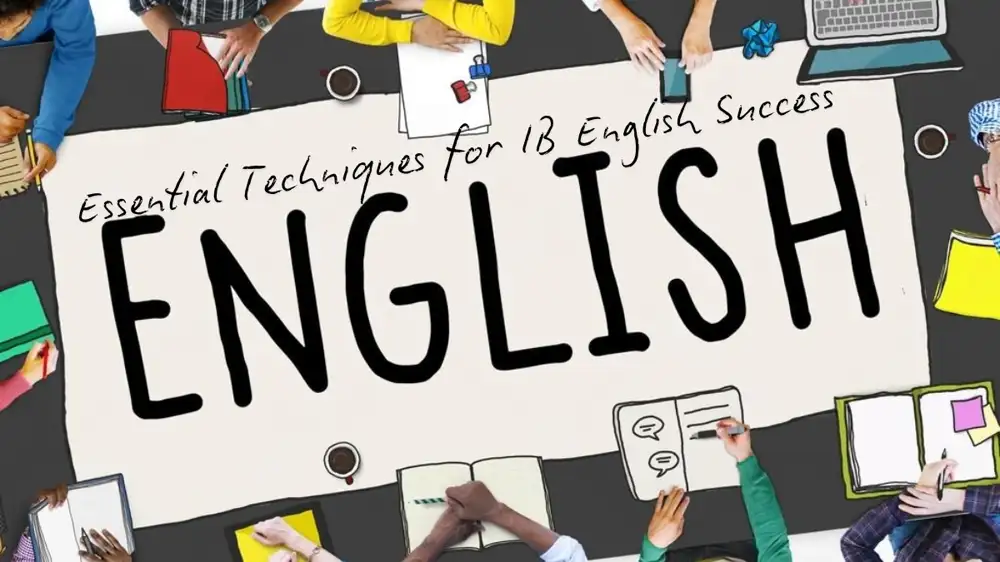Blog
Essential Techniques for IB English Success: Mastering the Art of Analysis

Effective text analysis is a key component of academic success for IB English students. Strong analysis abilities are necessary to uncover meaning, develop perceptive arguments, and receive high grades—whether you’re working on a challenging poem, a thought-provoking drama, or a convincing essay. This manual explores fundamental strategies that will enable you to analyze any material you come across in your IB English classes with assurance.
1. Going Further: Detailed Reading and Notes
Close reading, the methodical method of carefully examining each component of the text, is the cornerstone of sound analysis.
This primarily entails engaging with the text’s words, phrases, literary devices, and general organization. This allows us to explore the author’s intentions and the work’s deeper meaning. Additionally, this procedure enables us to pinpoint important motifs, themes, and symbols that support the main idea. We may also learn more about the author’s concept organization and how it affects the reader by looking at the text’s structure. In the end, we can gain a sophisticated comprehension of the text and recognize its literary value by closely reading it.
The following advice can help you read closely and effectively:
- Actively Read: Avoid skimming! As you read, make notes on any questions you have, underline important phrases, and highlight words that appear frequently.
- Annotate with a Purpose: Make use of annotations to document your early ideas, spot literary devices, and monitor the relationships between various textual sections.
- Read several times: The whole potential of the text is rarely shown in a single pass.Additionally, reading something again enables you to understand deeper levels of meaning and pick up on details that you might have missed the first time. Actually, you might discover fresh perspectives and interpretations every time you go back over the material. Thus, reading and rereading in an iterative manner is crucial to gaining a thorough comprehension of the text. It also enables you to recognize the author’s skill and the complex nature of the ideas being conveyed.
2. Interpreting Meaning: Symbolism and Literary Devices
Authors employ literary methods to enhance their work by giving it more nuance and complexity. Understanding the author’s intention and the main point of the message requires being able to identify these devices. The following are some typical literary devices to be mindful of:
- Metaphors: and similes are rhetorical devices that use comparisons between seemingly unrelated things to elicit powerful emotions or deeper meanings.
- Imagery: Authors use sensory information to create a mental image that appeals to your senses and affects your emotional response.
- Symbolism: More in-depth interpretations are possible when objects, persons, or situations are used to represent abstract ideas or themes.
- Irony: is a conflict between expectations and reality. It can be situational (events occurring in an unexpected way), dramatic (the audience), or verbal (saying one thing while meaning another). By identifying these devices and analyzing their purpose, you gain a richer understanding of the author’s message.
3.Examining Context: Social and Historical Context
There is more to literature than meets the eye. A text’s author’s intentions, topics, and even linguistic choices can be revealed by knowing the historical English and social environment in which it was written.
- Historical Context: Learn about the time period in which the text was composed. Which significant social, political, and cultural developments influenced the author’s worldview?
- Social Context: Take into account the literary trends, cultural issues, and dominant social standards of the age. In what ways does the text interact with these components?
You can better understand the text’s relevance and its potential remark on the historical background by investigating its context.
4.Exposing Language: Tone, Syntax, and Diction
When it comes to communicating meaning, language itself is essential. This encompasses the general tone or emotional ambiance produced, the author’s word choice (diction), and the sentence structure (syntax).
Diction: Examine the author’s word choice. Do they have a formal or informal tone? Is it easy or difficult? Do some word selections stir up specific feelings or images?
Syntax: Look at the arrangement of the sentences. Are there lengthy, intricate sentences that demonstrate a more philosophical approach, or are there brief, snappy sentences that express urgency?
- Tone: What emotions does the writer evoke in you? Is the tone serious, amusing, sarcastic, or depressing?Additionally, the overall meaning of the text is greatly influenced by its tone. Since tone influences the reader’s comprehension and emotional reaction, it can be claimed that tone is one of a text’s most crucial components. Through deliberate word choice and sentence construction, the author can convey a range of emotions, including comedy, seriousness, sarcasm, and optimism. For example, a serious tone might convey a sense of urgency or importance, while a funny tone can lighten the mood and make the writing more entertaining to read. In the end, the tone encourages the reader to make their own conclusions and serves to express the author’s stance about the topic the text in a specific way.
5. Fostering Connections: Textual Relationships and Intertextuality
Analyzing a text in isolation limits your understanding.
By examining intertextual connections and exploring the dialogue between texts, we can gain a deeper understanding of the themes, motifs, and stylistic choices employed by the author.
- Intertextuality: Explore references or allusions to other works, historical events, or cultural phenomena. What role do these references play in the meaning?
- Textual Relationships: Compare and contrast the text you’re analyzing with other works you’ve studied. Are there recurring themes, stylistic similarities, or contrasting perspectives?
By recognizing textual relationships and intertextuality, you can create a richer understanding of the text’s significance and place within a broader literary context.
6. Engaging with Critical Perspectives
English Developing your own analysis doesn’t mean operating in a vacuum. Consider how other critics have interpreted the text.
- Read Critical Reviews and Analyses: Explore different interpretations of the text. This can broaden your perspective and offer you new avenues for analysis.
- Develop Your Own Perspective: Don’t just follow the crowd! After considering different critical perspectives, formulate your own well-supported analysis.
Engaging with critical perspectives allows you to develop a nuanced understanding of the text.
5 FAQs About IB English Analysis Techniques
1. What is close reading, and why is it important?
In English Close reading is a careful and detailed analysis of a text. It involves reading and rereading the text, paying close attention to the words, sentences, and structure. Close reading helps you to identify key themes, literary devices, and the author’s purpose.
2. How can I identify literary devices in a text?
Literary devices are techniques in IB English that authors use to enhance their writing. Some common literary devices include:
- Simile: A comparison using “like” or “as”
- Metaphor: A direct comparison without using “like” or “as”
- Imagery: Using descriptive language to create a picture in the reader’s mind
- Symbolism: Using objects or ideas to represent something else
- Irony: Does, in fact, indicate a disparity between expectations and reality. In fact, it is a literary device that adds depth and complexity to a text, often surprising and engaging the reader. Moreover, it can take various forms, such as verbal irony, situational irony, and dramatic irony. For instance, verbal irony involves saying one thing but meaning the opposite, while situational irony occurs when the outcome of a situation is unexpected. Furthermore, when the audience is aware of information that the characters are unaware of, dramatic irony occurs.Ultimately, irony can be used to highlight a particular theme or to create a sense of humor or suspense.
3. What is the importance of context in literary analysis?
You can gain a deeper understanding of the author’s goals and the text’s meaning by being aware of the historical, social, and cultural background of the work. This includes considering the time period in which the text was written, the author’s background, and the social and political issues of the time.
4. How can I compose a compelling essay that analyzes literature?
A well-written thesis statement, textual evidence, and an analysis of that evidence are all essential components of a great literary analysis essay. Be sure to use strong topic sentences and transitions to guide your reader through your argument.
5. Which typical errors in literary interpretation should one steer clear of?
Some common mistakes to avoid include:
- Oversimplifying the text: Don’t be afraid to delve deep into the text and explore complex ideas.
- Making generalizations: Avoid making broad statements about the text without supporting evidence.
- Focusing too much on plot summary: Remember, your analysis should focus on the deeper meaning of the text.
In conclusion
To succeed in IB English, one must become proficient in the skill of analysis. You can create perceptive interpretations and strong arguments by fusing close reading, literary device analysis, contextual awareness, language analysis, and interconnected connections. To deepen your comprehension and create your own original analysis, don’t forget to interact with critical viewpoints.
You can improve your analysis abilities and accomplish your academic objectives with regular practice and an acute attention to detail. Have fun with your analysis!
Blog
Paper Screening Based Test Ph-V for DM (B-15) Domicile holders of Nowshera, Charsadda & Malakand District in the E&SED Khyber Pakhtunkhwa [TEST DATE: 1st June’ 2025]
Candidate’s Answer Sheet Section
PST (BPS-12), CT (BPS-15), PET (BPS-15), DM (BPS-15), TT (BS-15)
Blog
How to gain High-Value clients on LinkedIn?

Key Points
- Research suggests optimizing your LinkedIn profile and engaging with your network can help gain a clients on LinkedIn.
- It seems likely that building relationships through personalized outreach and providing value are effective strategies.
- The evidence leans toward consistency and patience being crucial for success on LinkedIn.
Optimize Your Profile
Start by ensuring your LinkedIn profile is professional and appealing. Use a clear headshot, craft a headline that highlights what you offer, and write a summary showcasing your expertise. This makes you more visible to potential clients.
Build and Engage Your Network
Connect with industry professionals and potential clients, personalizing your requests to increase acceptance. Engage by liking, commenting, and sharing their posts, and join relevant LinkedIn groups to expand your reach.
Reach Out and Provide Value
Send personalized messages to potential clients, focusing on building relationships rather than selling immediately. Share useful content, offer free resources, or host webinars to demonstrate your expertise and build trust.
Move Conversations Offline and Be Consistent
Once you’ve built rapport, suggest a call or meeting to discuss how you can help. Stay consistent with daily engagement, as gaining clients on LinkedIn takes time and persistence.
Detailed Strategies for Gaining Clients on LinkedIn
This section provides a comprehensive guide based on extensive research into LinkedIn client acquisition strategies, drawing from multiple authoritative sources. The following details expand on the key points, offering a step-by-step approach for users looking to leverage LinkedIn effectively.
Profile Optimization: The Foundation for Visibility
Your LinkedIn profile is your digital storefront, and optimizing it is critical for attracting clients. Use a professional headshot to make a strong first impression, as profiles with photos receive more views. Craft a compelling headline that clearly states your value proposition, such as “Freelance Graphic Designer Helping Brands Stand Out” rather than a generic title like “Designer.” The summary should highlight your expertise, past achievements, and what you offer, using relevant keywords to improve search visibility. For example, if you’re targeting marketing agencies, include terms like “digital marketing,” “brand strategy,” and “client growth.”
Research from Dripify: How to Get Clients From LinkedIn emphasizes using SEO techniques, such as incorporating keywords in your headline and summary, to ensure your profile appears in searches. Additional resources, such as Dripify: Improve LinkedIn Profile and Dripify: LinkedIn SEO, provide detailed tips on enhancing visibility.
Identifying and Targeting Ideal Clients
To gain clients, you must first define your ideal customer avatar. This involves identifying their industry, job titles, and pain points. For instance, if you’re a web developer, target marketing managers in e-commerce firms. Use LinkedIn’s advanced search to filter by keywords, location, and industry, and consider Boolean operators (e.g., “web development” AND “e-commerce”) for refined results, as suggested by Dripify: Boolean Search on LinkedIn.
For advanced targeting, LinkedIn Sales Navigator offers features like lead recommendations and saved leads, though it’s a paid tool. The LinkedIn Sales Blog: 7 Steps to Attract More Clients With LinkedIn recommends using Sales Navigator for criteria like title and industry, with insights from LinkedIn: How to Use Sales Navigator.
Building and Engaging Your Network
Networking is at the heart of LinkedIn client acquisition. Start by connecting with colleagues, former clients, and industry leaders, personalizing each request to increase acceptance rates. For example, mention a shared interest or connection in your message. Engage with your network by liking, commenting, and sharing their posts, which helps build rapport.
Participating in LinkedIn groups is another effective strategy. Join groups relevant to your industry, such as “Digital Marketing Professionals,” and contribute by answering questions or sharing insights. Dripify: LinkedIn Groups highlights this as a way to connect with potential clients. Additionally, publishing thought leadership content, such as LinkedIn Articles addressing audience pain points, can position you as an expert. An example is the article “5 Game-Changing Digital Marketing Strategies for Small Businesses,” as noted in Dripify: LinkedIn Articles.
Personalized Outreach and Relationship Building
Once connected, avoid the mistake of immediate pitching, which can alienate potential clients. Instead, send personalized messages that focus on building relationships. For instance, ask about their current challenges or share a relevant article. The LinkedIn Sales Blog advises speaking like a human, finding commonalities, and following advice from experts like Will Allred on communication, available at LinkedIn: Don’t Pitch and Connect.
The DigitalMarketer: Build a Steady Stream of Clients suggests a non-salesy welcome message, including a question like “Tell me something interesting about your work,” to drive engagement. This approach, informed by Ted Prodromou’s book Ultimate Guide to LinkedIn for Business, emphasizes helping without expecting immediate returns, pretending you’re at a coffee meeting.
Providing Value to Build Trust
Providing value is crucial for converting connections into clients. Share resources, guides, or e-books that address your target audience’s pain points. For example, host a webinar on “Effective Social Media Strategies for Small Businesses” to showcase your expertise. Dripify: Create Value for Customers offers ideas like sharing case studies or hosting workshops.
Engaging in conversations is also key—be proactive by offering insights on posts or articles, and ask questions to spark dialogue. This builds trust and positions you as a helpful resource, as noted in Dripify: How to Get Clients From LinkedIn.
Moving Conversations Offline and Closing Deals
After building rapport, transition relationships offline by suggesting a phone call or virtual meeting. The DigitalMarketer process includes inviting responders to a short call, asking, “Would you like my help?” at the end, and closing deals via these interactions. The LinkedIn Sales Blog emphasizes demonstrating credibility before moving offline, ensuring you’ve established value.
Leveraging Recommendations and Referrals
Recommendations enhance your profile’s credibility, making it easier to attract clients. Ask satisfied clients or colleagues for recommendations, highlighting specific projects. For example, request, “Could you recommend me based on our recent website redesign project?” Follow up with gratitude, as outlined in Dripify: LinkedIn Recommendations, which lists five steps: identify connections, personalize, highlight relationships, be specific, and express gratitude.
Additionally, leverage your existing network for referrals. Reach out to former colleagues or friends, personalizing messages to seek introductions, as suggested in Dripify: How to Get Clients From LinkedIn.
Consistency and Patience: The Long-Term Approach
Gaining clients on LinkedIn requires consistency. Dedicate 30 minutes daily to engage, as per the DigitalMarketer 8-step process, which includes connecting, messaging, and following up. The LinkedIn Sales Blog stresses building your reputation over time, with success stories like Darren McKee, who gained 1,000 followers per week by posting consistently for over 1,000 days, detailed at LinkedIn: Posted on LinkedIn 950 Days Straight.
Patience is key, as results take time. The Dripify article notes LinkedIn’s 800 million members worldwide offer immense potential, but building relationships is a gradual process.
Additional Strategies for Advanced Users
For those looking to scale, consider using LinkedIn automation tools like Dripify for connection requests and follow-ups, ensuring compliance with LinkedIn’s policies, as detailed at Dripify: LinkedIn Automation Tools. Optimize your Social Selling Index (SSI) for better performance, with tips at Dripify: LinkedIn SSI Score. Drive traffic to your website via your profile link, share content, and use LinkedIn ads for broader reach, as noted in Dripify: Increase Website Traffic Using LinkedIn.
Collaborate with influencers for guest posts or joint webinars to expand your audience, as suggested at Dripify: Digital Marketing Experts. For hidden profiles, use LinkedIn X-Ray Search, detailed at Dripify: LinkedIn X-Ray Search.
Tables: Key Strategies and Tools
Below is a table summarizing the core strategies, with corresponding tools and resources:
| Strategy | Description | Tools/Resources |
|---|---|---|
| Profile Optimization | Enhance visibility with professional photo, headline, summary, keywords. | Dripify: Improve LinkedIn Profile, Dripify: LinkedIn SEO |
| Network Building | Connect with professionals, personalize requests, engage via likes/comments. | Dripify: Self-Entrepreneur LinkedIn |
| Group Engagement | Join industry groups, participate in discussions, share expertise. | Dripify: LinkedIn Groups |
| Content Publishing | Share articles addressing pain points, engage in comments. | Dripify: LinkedIn Articles |
| Advanced Search | Use keywords, filters, Boolean operators for targeted searches. | Dripify: Boolean Search on LinkedIn |
| Sales Navigator | Advanced filters, lead recommendations, InMail for direct messaging. | Dripify: How to Use LinkedIn Sales Navigator |
| Recommendations | Request from clients, highlight projects, express gratitude. | Dripify: LinkedIn Recommendations |
| Value Provision | Share resources, host webinars, address audience challenges. | Dripify: Create Value for Customers |
Another table for daily engagement, based on the 8-step process:
| Step | Daily Action | Time Estimate |
|---|---|---|
| 1 | Identify ideal customer, use worksheet for targeting. | 5 minutes |
| 2 | Define problems you solve, focus on results. | 5 minutes |
| 3 | Optimize profile, ensure headline and summary attract clients. | 5 minutes |
| 4 | Connect, send non-salesy messages, include questions. | 5 minutes |
| 5 | Keep in touch, share relevant content every few months. | 5 minutes |
| 6 | Invite to calls, ask if they need help, close deals. | 5 minutes |
| 7 | Build authority, write recommendations, prompt reciprocation. | 5 minutes |
| 8 | Repeat steps 4-7 daily, maintain consistency. | Ongoing |
Success Stories and Statistics
Success stories underscore the potential of these strategies. Darren McKee’s consistent posting for over 1,000 days resulted in 1,000 followers per week, as detailed at LinkedIn: Posted on LinkedIn 950 Days Straight. The DigitalMarketer process helped create a six-figure business, with Ted Prodromou’s book Ultimate Guide to LinkedIn for Business providing further insights. LinkedIn’s 800 million members, as noted in Dripify, offer a vast pool for client acquisition.
Conclusion
Gaining clients on LinkedIn is a multifaceted process requiring profile optimization, targeted networking, engagement, and consistent effort. By following these strategies, users can build relationships, provide value, and ultimately secure clients, with patience being essential for long-term success.
Blog
How to Make Vegan Leather from Recycled Materials: A Step-by-Step Guide

In recent years, vegan leather has become a cruelty-free and eco-friendly alternative to traditional animal leather. But did you know you can take sustainability a step further by creating vegan leather from recycled materials? This innovative approach reduces waste, lowers carbon footprints, and empowers you to craft stylish, durable goods at home.
This guide explores simple, creative methods to make vegan leather using everyday recycled items like plastic bottles, cork, pineapple leaves, and more. Let’s dive in!
Why Choose Vegan Leather from Recycled Materials?
Traditional leather production harms the environment through deforestation, water pollution, and methane emissions from livestock. Vegan leather offers a compassionate alternative, but many store-bought options rely on synthetic plastics like PVC, which aren’t biodegradable.
By using recycled materials, you:
- Reduce landfill waste (e.g., repurposing plastic bottles or fruit scraps).
- Save resources (no need for virgin plastics or animal farming).
- Create customizable, unique textures (each material has its look and feel!).
Whether you’re a DIY enthusiast or a sustainability advocate, making vegan leather at home is a fun, impactful project.
Materials You Can Use to Make Vegan Leather
Almost any flexible, durable recycled material can become vegan leather! Here are the most popular options:
- Recycled Plastic (rPET): Plastic bottles, packaging, or old polyester fabrics.
- Cork: Wine corks, corkboard scraps, or industrial cork waste.
- Plant-Based Fibers: Pineapple leaves (Piñatex), apple peels, or mushroom mycelium.
- Upcycled Fabrics: Denim, canvas, or rubber from old tires.
Each material requires slightly different techniques. Below, we’ll break down five easy methods.
Method 1: Recycled Plastic Bottle Leather (rPET)
Materials Needed:
- Clean plastic bottles (PET)
- Scissors or craft knife
- Non-toxic adhesive (e.g., cornstarch glue)
- Baking parchment
- Iron or heat press
Steps:
- Prepare the Plastic:
Cut bottles into flat sheets. Remove labels and caps, then slice vertically. Flatten the pieces and trim the edges. - Create Layers:
Overlap plastic pieces on baking parchment. Apply adhesive between layers to bond them. - Press and Heat:
Cover with another parchment sheet. Iron at medium heat (150°C/300°F) for 10–15 seconds, applying even pressure. Repeat until layers fuse into a flexible sheet. - Finish:
Let cool. Sand edges for smoothness, or dye with natural pigments for color.
Best For: Bags, wallets, and accessories. rPET leather is water-resistant and sturdy!
Method 2: Cork Leather from Wine Corks
Materials Needed:
- Wine corks (10–15 for a small sheet)
- Food processor or grater
- Non-toxic binder (flour paste or eco-friendly glue)
- Rolling pin
- Wax paper
Steps:
- Shred the Corks:
Grate corks into fine granules using a food processor. Avoid plastic-backed corks. - Mix with Binder:
Combine cork granules with binder until it forms a dough-like consistency. - Roll and Dry:
Place the mixture between wax paper sheets. Roll flat (3–5mm thick). Air-dry for 24–48 hours. - Seal (Optional):
Brush with beeswax or linseed oil for a polished, water-resistant finish.
Best For: Notebook covers, coasters, or jewelry. Cork is lightweight and naturally textured.
Method 3: Pineapple Leaf Leather (Piñatex)
Materials Needed:
- Pineapple leaves (from 5–6 pineapples)
- Blender
- Natural dye (optional)
- Cornstarch or agar-agar (as a binder)
- Mesh screen or cloth
Steps:
- Extract Fibers:
Boil leaves for 30 minutes to soften. Scrape off pulp with a knife, revealing long fibers. Rinse and dry. - Blend and Bind:
Mix fibers with 1 cup water and 2 tbsp binder in a blender. Pour onto a mesh screen to form a thin layer. - Dry and Press:
Sun-dry for 2–3 days, pressing occasionally with a heavy book to flatten.
Best For: Shoes, belts, or upholstery. Piñatex has a rustic, fibrous appearance.
Method 4: Mushroom Leather (Mycelium)
Materials Needed:
- Mushroom mycelium starter kit (available online)
- Organic substrate (sawdust or straw)
- Baking tray
- Dehydrator or oven
Steps:
- Grow Mycelium:
Spread the substrate in a tray. Inoculate with mycelium spores. Store in a dark, humid place for 2–3 weeks. - Harvest and Press:
Once fully grown, peel the mycelium mat from the substrate. Press between boards to flatten. - Tan and Dry:
Soak in a natural tannin (like oak gall solution) for 1 hour. Dehydrate at 40°C (104°F) until leathery.
Best For: High-fashion items. Mycelium leather is biodegradable and mimics animal leather’s softness.
Method 5: Apple Peel Leather
Materials Needed:
- Apple peels (from 10–12 apples)
- Blender
- Glycerin or vegetable glycerin
- Baking sheet
Steps:
- Blend Peels:
Puree peels with 1 tbsp glycerin until smooth. - Spread and Dry:
Pour the mixture onto a baking sheet lined with parchment. Dry in sunlight or an oven at 50°C (120°F) for 8–12 hours. - Finish:
Peel off the sheet. Condition with coconut oil for flexibility.
Best For: Small accessories or decorative patches. Apple leather has a fruity scent and matte finish.
Customizing Your Vegan Leather
Make your creations stand out with these tips:
- Dyeing: Use turmeric (yellow), beet juice (pink), or spirulina (green).
- Embossing: Press leaves or lace into the material before drying.
- Stitching: Reinforce edges with upcycled thread or hemp cord.
Caring for Vegan Leather
- Cleaning: Wipe with a damp cloth. Avoid harsh chemicals.
- Storage: Keep in a cool, dry place to prevent mold.
- Repair: Patch tears with adhesive or a matching material piece.
Environmental Impact and Challenges
Pros:
- Reduces plastic and organic waste.
- Uses less water and energy than animal leather.
Cons:
- Some methods require practice to perfect.
- Plant-based leathers may be less durable than synthetics.
5 FAQs about How to Make Vegan Leather from Recycled Materials
1. Can I make vegan leather at home without specialized equipment?
Answer: Absolutely! Many methods for making vegan leather from recycled materials require only basic household items like scissors, a blender, an iron, or a baking sheet. For example, creating cork leather or apple peel leather can be done with minimal tools. While some techniques, like growing mushroom leather, may need a starter kit, most DIY vegan leather projects are beginner-friendly and don’t require expensive equipment.
2. How durable is vegan leather made from recycled materials compared to traditional leather?
Answer: The durability of vegan leather depends on the materials and methods used. For instance, recycled plastic bottle leather (rPET) is highly durable and water-resistant, making it ideal for bags and accessories. On the other hand, plant-based options like pineapple or apple leather may be softer and better suited for lightweight items. While vegan leather may not always match the longevity of traditional leather, proper care (like sealing and conditioning) can significantly extend its lifespan.
3. Is vegan leather from recycled materials biodegradable?
Answer: It depends on the materials used. Plant-based vegan leathers, such as those made from pineapple leaves, cork, or mushroom mycelium, are biodegradable and compostable. However, vegan leather made from recycled plastics (like rPET) is not biodegradable, though it still helps reduce waste by repurposing existing materials. If biodegradability is a priority, opt for natural, plant-based options.
4. Can I scale up DIY vegan leather production for small businesses?
Answer: Yes, you can! Many of the methods described in the article, such as using pineapple leaves or recycled plastics, can be scaled up with some adjustments. For example, investing in a heat press for rPET leather or a dehydrator for mushroom leather can streamline production. Additionally, sourcing bulk recycled materials and experimenting with efficient techniques can help you create consistent, high-quality vegan leather for a small business.
5. What are the best ways to dye vegan leather naturally?
Answer: Natural dyes are a great eco-friendly option for coloring vegan leather. You can use ingredients like turmeric (for yellow), beet juice (for pink), spirulina (for green), or coffee grounds (for brown). Simply mix the dye with water, apply it to the material using a brush or sponge, and let it dry. For a more vibrant color, repeat the process or add a natural fixative like vinegar. This approach is safe, sustainable, and adds a unique touch to your creations.
Final Thoughts
Creating vegan leather from recycled materials is a rewarding way to support sustainable fashion. Whether you’re crafting a wallet from plastic bottles or a chic bag from pineapple leaves, each project makes a difference. Ready to start? Gather your materials, experiment with textures, and share your creations to inspire others!
By embracing DIY vegan leather, you’re not just making accessories—you’re shaping a greener future.
Most People ask questions on Google about How to Make Vegan Leather from Recycled Materials
What is the process of making vegan leather?
Vegan leather is made without animal hides and instead uses plant-based or synthetic materials. The process varies depending on the type of material used but generally follows these steps:
- Material Sourcing – Vegan leather can be made from plants like mushrooms, pineapples, apples, cacti, or synthetic materials like polyurethane (PU).
- Processing & Treatment – Plant fibers are extracted and mixed with binders or resins to create a durable, leather-like texture. In synthetic versions, plastic is melted and spread into thin layers.
- Shaping & Drying – The material is shaped into sheets and left to dry. This stage determines its thickness and flexibility.
- Texturizing & Coloring – To mimic real leather, the material is embossed with a grain pattern and dyed using eco-friendly or synthetic dyes.
- Finishing Touches – A protective coating is applied for durability, water resistance, and longevity.
How do you make vegan plant-based leather?
Plant-based vegan leather is made using natural materials and fewer chemicals compared to synthetic alternatives. The process depends on the plant source but generally includes:
- Collection & Processing – Fruit waste (pineapple leaves, apple peels, etc.), cactus, or mushrooms are harvested and dried.
- Fiber Extraction & Blending – The plant fibers are broken down and mixed with natural binders like starch or plant-based resins to form a leather-like sheet.
- Shaping & Texturing – The material is rolled out, textured, and sometimes reinforced with fabric backings for extra strength.
- Tanning & Dyeing – The sheets are treated with natural tannins (from tree bark, for example) and dyed with plant-based or non-toxic dyes.
- Finishing – A protective, biodegradable coating is applied for durability and water resistance.
Popular plant-based vegan leathers include Piñatex (pineapple leather), Mylo (mushroom leather), and Desserto (cactus leather).
How do you recycle vegan leather?
Recycling vegan leather depends on its materials:
- Plant-based vegan leather is biodegradable, meaning it will naturally break down over time. Some types can be composted in industrial facilities.
- Synthetic vegan leather (PU, PVC) is harder to recycle due to plastic content. Some brands have take-back programs for recycling.
- Upcycling is another option—old vegan leather items can be repurposed into new accessories like wallets or keychains.
To be more eco-friendly, look for plant-based or recycled-material vegan leathers rather than plastic-based options.
What materials are used to make vegan leather?
Vegan leather is made from a variety of natural and synthetic materials, including:
🌱 Plant-Based Materials:
- Pineapple leaves (Piñatex)
- Cactus (Desserto)
- Mushrooms (Mylo)
- Apple peels
- Cork
- Banana fibers
🛠 Synthetic Materials:
- Polyurethane (PU)
- Recycled plastics (from bottles or industrial waste)
- Polyvinyl chloride (PVC) – less eco-friendly
The best vegan leathers are plant-based or made from recycled materials, as they are more sustainable than plastic-based versions.
What are the ingredients in vegan leather?
The ingredients vary depending on the type of vegan leather:
- Plant-Based Leather – Natural plant fibers, bio-based binders (like corn starch or natural resins), plant-based dyes, and protective coatings made from waxes or oils.
- Synthetic Vegan Leather – Polyurethane (PU) or PVC, plasticizers, synthetic dyes, and chemical coatings for texture and durability.
For an eco-friendly choice, look for low-plastic, biodegradable vegan leathers made from plants or recycled materials.
-

 Travel7 months ago
Travel7 months agoTop 5 Ways Stephen Revetria Elevates the U.S. Travel and Tourism Advisory Board
-

 Crypto8 months ago
Crypto8 months agoUnlock 7 Powerful Cryptocurrency Insights: Delving into NewzNav.com’s Crypto Archives
-

 Technology8 months ago
Technology8 months agoHydrogen Water Machines: Revolutionizing Hydration and Wellness
-

 NEWS & Society8 months ago
NEWS & Society8 months agoChurch of the Holy Spirit News: Events & Impact
-

 Games8 months ago
Games8 months agoDownload Tekken 6 PC: A Comprehensive Resource
